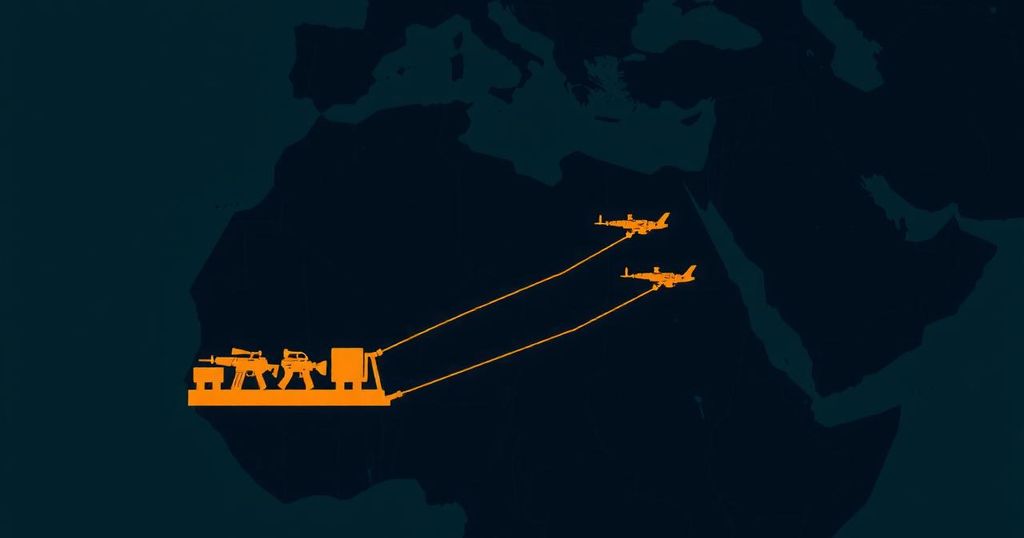Egypt’s recent arms shipment to Somalia has raised alarms in Ethiopia, intensifying tensions surrounding the long-standing dispute over the Grand Ethiopian Renaissance Dam. The complexities of the relationship between Ethiopia and Somalia, compounded by Ethiopia’s agreement with Somaliland, further exacerbate the regional instability, leading to concerns over an arms race and potential conflict escalation.
Egypt has dispatched a second arms shipment to Somalia within a month, provoking discontent from Ethiopia, a rival of Egypt. As confirmed by Egypt’s foreign ministry, this shipment seeks to enhance the capabilities of the Somali army with the aim of ensuring security, combating terrorism, and asserting sovereignty. However, Ethiopian Foreign Minister Taye Atske Selassie has expressed apprehension that these external arms shipments could exacerbate the already fragile security situation and potentially empower terrorist groups. The longstanding dispute between Egypt and Ethiopia regarding the construction of the Grand Ethiopian Renaissance Dam (GERD) remains a significant backdrop to this development. Since the dam’s inception, Egypt has been alarmed, as it relies on the Blue Nile for approximately 95% of its fresh water. Additionally, tensions between Ethiopia and Somalia have escalated due to Ethiopia’s agreement with the self-declared Somaliland region, which Somalia perceives as an attempt to annex its territory. The interconnection between these issues reflects a coordinated effort by Egypt and Somalia to oppose Ethiopia’s water policies. According to Harry Verhoeven, a Horn of Africa energy and infrastructure expert, the region is straining under fiscal limitations, indicating that political maneuvers could lead to uncontrolled conflicts. Adding to these regional uncertainties, over 20 million individuals in East Africa are currently displaced due to conflicts and severe weather, according to the International Migration Organization. In reaction to Egypt’s arms shipments, Somaliland has warned of the potential for an arms race that could destabilize the already precarious regional security situation. Moreover, the recent memorandum of understanding between Ethiopia and Somaliland has further complicated the regional dynamics, causing concern among Somali officials who fear it may split their nation and allow Ethiopia to establish a naval presence. Ethiopian intelligence chief Redwan Hussien has confirmed these worries, stating that Ethiopia has a keen interest in ensuring secure access to the coast. Somalia’s initial diplomatic strategies seem to be shifting, as officials now suggest they might consider supporting anti-Ethiopian rebels if tensions escalate. Egypt’s involvement has intensified following a military pact with Somalia, integrating Egypt into the UN-backed African Union peacekeeping mission against the insurgent group al-Shabaab. This newfound collaboration has raised alarms in Ethiopia, which has hinted at the destabilizing nature of Egypt’s influence in the region. Ethiopia claims to have historically aided Somalia in its fight against terrorism while maintaining its own strategic interests. Indeed, the Ethiopian leadership regards its access to the sea and water as critical to its future growth and development. Attempts for diplomatic resolution have faltered; for example, Djibouti has offered Ethiopia commercial, but not military, access to its ports. Furthermore, efforts by Turkey to mediate indirect talks between Ethiopia and Somalia have yet to yield any fruitful outcomes. Somalia maintains that discussions cannot advance unless Ethiopia retracts its agreement with Somaliland.
The diplomatic relations and regional politics of the Horn of Africa have become increasingly intricate, particularly with the evolving dynamics between Egypt, Ethiopia, and Somalia. The Grand Ethiopian Renaissance Dam (GERD) constructed by Ethiopia poses significant concerns for Egypt, which heavily depends on the Nile River, leading to heightened tensions. The realignment of alliances and new agreements, particularly the memorandum between Ethiopia and Somaliland, have compounded these tensions, putting additional strain on relations between Somali and Ethiopian governments. The combination of military actions, perceived threats, and national sovereignty issues illustrates the volatility of this region and underscores the necessity for careful diplomatic negotiations.
In summary, the ongoing arms shipments from Egypt to Somalia have illuminated the fragile security landscape of the Horn of Africa, further complicating the already tense relations with Ethiopia. The potential implications of these arms transfers could usher in unintended consequences amidst the backdrop of regional disputes over water rights and territorial integrity. As diplomatic efforts continue to falter, the risk of escalating conflict remains prevalent, emphasizing the urgency for effective communication and resolution strategies to stabilize the region.
Original Source: www.theguardian.com






